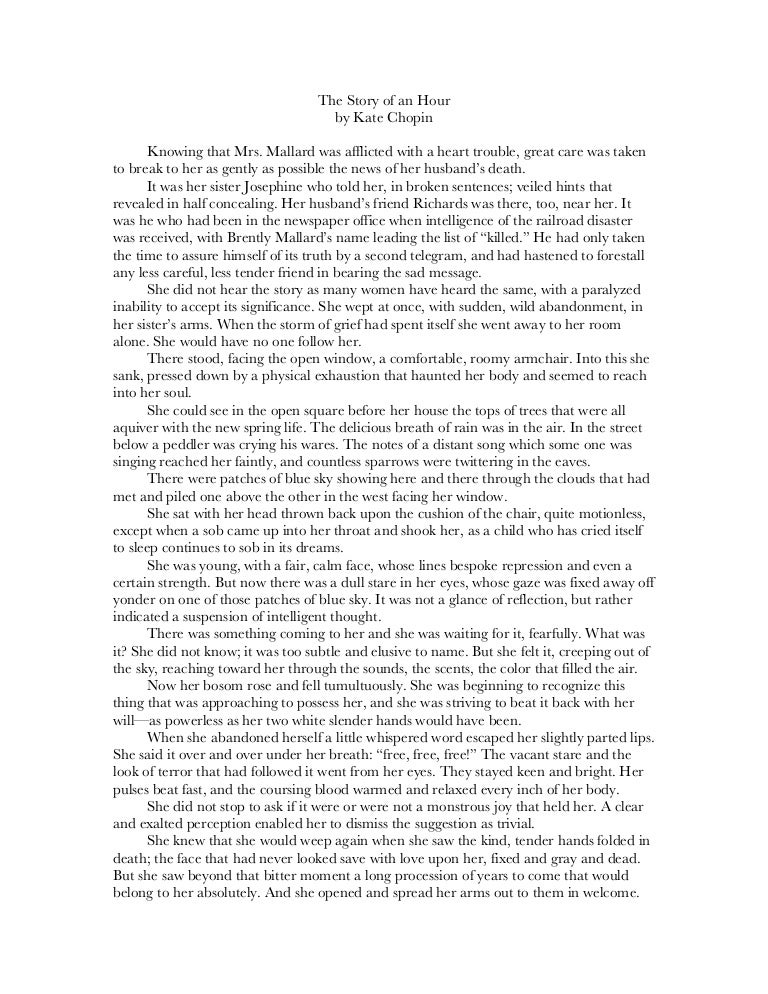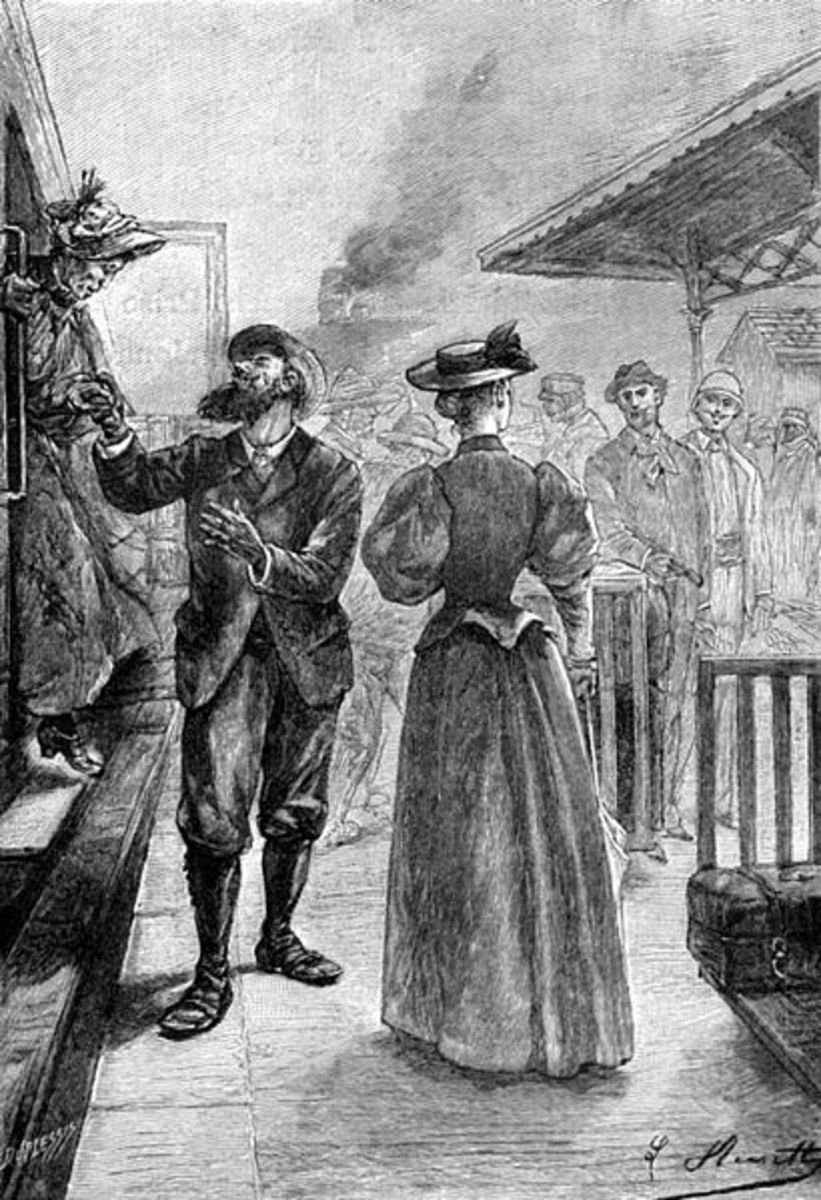Have you ever felt a fleeting sense of liberation, a brief moment of joy at the thought of being unshackled from the constraints of your life? In Kate Chopin’s poignant short story “The Story of an Hour,” Louise Mallard experiences this exact sensation, though her newfound freedom comes at a tragic cost. The story, a mere three pages long, explores the complexities of marriage, societal expectations, and the yearning for individual autonomy, leaving a powerful impact on the reader long after the last page has been turned.

Image: www.slideshare.net
Published in 1894, “The Story of an Hour” was met with both critical acclaim and controversy, ultimately facing censure for its challenging portrayal of female desire and its exploration of the limitations imposed on women in the late 19th century. However, the story has withstood the test of time, becoming a cornerstone of American literature and a powerful testament to the enduring themes of freedom and individual expression. This essay delves into the depths of Chopin’s masterful work, examining the narrative structure, character development, and enduring relevance of “The Story of an Hour,” drawing upon academic analyses and contemporary interpretations to understand the story’s lasting impact.
A Journey of Unexpected Emotions
The story begins with the news of Mr. Mallard’s death, delivered to Louise with the utmost care. However, as Louise retreats to her room, the initial shock gives way to an unexpected surge of emotion. She experiences a profound sense of liberation, a feeling of newfound freedom from the constraints of her marriage. This is a controversial scene, as it challenges the conventional societal expectations of a grieving widow. Many critics at the time found Louise’s reaction to be inappropriate and even immoral, yet it reveals the complex and often hidden emotions of a woman trapped within a marriage that offers her little personal fulfillment.
“She knew it was the sign of her own coming liberation” (Chopin, 1894), this line signifies Louise’s realization of the newfound freedom that awaits her. She envisions a future where she can control her own destiny, a future free from the limitations imposed by societal norms and the expectations of her marriage. However, this newfound freedom is short-lived. The story ends tragically, with Louise’s heart failing at the sight of her husband’s unexpected return, a crushing blow to her newfound autonomy.
The Symbolism of the Open Window
Chopin uses the motif of an open window throughout the story to symbolize the transition from a state of confinement to freedom. When Louise retreats to her room, she approaches the window, signifying her journey towards understanding her own emotions and desires. The window opens to the world, “a blue sky, a patch of green, and a singing bird” (Chopin, 1894), representing the vast possibilities that lie beyond the confines of her marital life.
The open window becomes a visual metaphor for her yearning for personal freedom. However, this symbolism remains tragically incomplete, as the story ends with Louise’s sudden death, leaving the reader to ponder the true nature of her liberation. Did her heart fail from shock, or did it fail because she was abruptly denied the freedom she had glimpsed?
A Controversial Legacy
Chopin’s bold exploration of female desires and the limitations imposed on women in her time sparked controversy. The story was met with criticism for its depiction of a woman experiencing joy at the supposed loss of her husband. This reaction was reflective of the societal norms of the time, where women were expected to be submissive and subservient to their husbands.
While “The Story of an Hour” was deemed inappropriate in its day, it has been lauded by modern critics for its insightful examination of gender roles and the limitations placed on women. Chopin challenged the traditional narratives of grief and mourning, forcing readers to question the societal expectations placed on women, particularly those within the constraints of marriage.

Image: vikrammaija.blogspot.com
Beyond the Constraints of Society
The story’s enduring relevance lies in its poignant exploration of the human yearning for individual autonomy, transcending specific historical contexts. Chopin’s work resonates powerfully with readers today, providing a stark reminder of the complexities of societal expectations, the potential for liberation, and the human cost of societal constraints. “The Story of an Hour” serves as a poignant reminder of the enduring struggle for individual freedom, making it a powerful and thought-provoking piece of literature that continues to resonate with audiences even today.
Why “The Story of an Hour” Matters Today
Although written over a century ago, “The Story of an Hour” remains a powerful commentary on the complex relationship between societal expectations, personal desires, and the struggle for individual autonomy. Despite significant progress in gender equality, the story still echoes the challenges faced by individuals who are pressured to conform to societal norms. The desire for personal freedom remains a universal human experience, making Chopin’s work timeless and relevant for modern audiences.
The Story Of An Hour Kate Chopin Pdf
Explore Further: A Final Thought
Reading “The Story of an Hour” can leave a profound impact, prompting reflection and contemplation on the nature of freedom, the complexities of personal desires, and the societal barriers that can restrict them. If you haven’t already, consider reading this short but powerful work and exploring its enduring relevance for yourself. As you reflect on the story’s themes, you will likely find yourself questioning the limits of societal expectations and the importance of pushing for your own individual liberation.






